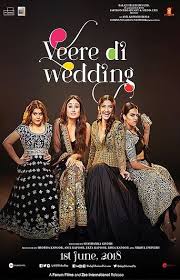Friendship, love, and the chaos of modern relationships collide in this bold and unapologetic tale of four women navigating life’s complexities. Directed by Shashanka Ghosh, Veere Di Wedding is a coming-of-age dramedy starring Kareena Kapoor Khan, Sonam Kapoor Ahuja, Swara Bhasker, and Shikha Talsania in lead roles. Set in the vibrant urban landscapes of Delhi and Mumbai, this contemporary tale is a celebration of female camaraderie amidst the backdrop of a big, fat Indian wedding. The film combines humor, drama, and moments of introspection, breaking stereotypes about women in Indian cinema.
The story follows Kalindi, Avni, Sakshi, and Meera—four childhood friends who reunite for Kalindi’s wedding. Each woman is dealing with her own struggles: Kalindi (Kareena) is apprehensive about commitment and societal expectations, Avni (Sonam) is torn between her desire for independence and her family’s pressure to settle down, Sakshi (Swara) is coping with the fallout of a broken marriage, and Meera (Shikha) is juggling motherhood with unresolved family tensions. Their journey takes them through emotional highs and lows, exploring themes of identity, freedom, and the bonds that hold them together. While the wedding serves as the focal point, the narrative is more about the evolution of their friendship and personal growth.
One of the standout aspects of the film is its portrayal of female friendships. The chemistry between the leads feels authentic, capturing the playful banter, unspoken understanding, and unconditional support that define real-life friendships. Kareena brings a natural elegance to Kalindi, portraying her emotional vulnerability and inner conflict with finesse. Sonam’s Avni strikes a balance between vulnerability and determination, while Swara’s Sakshi steals the show with her bold and unapologetic portrayal of a woman embracing her imperfections. Shikha’s Meera is the emotional anchor, delivering a nuanced performance that adds depth to the group dynamic. Together, the quartet exudes a camaraderie that is both relatable and inspiring.
The film’s direction by Shashanka Ghosh is vibrant and energetic, with a focus on creating moments that are both visually appealing and emotionally resonant. Ghosh succeeds in crafting a narrative that feels fresh, even though it relies on some predictable tropes. The screenplay, written by Nidhi Mehra and Mehul Suri, is peppered with witty dialogues and sharp humor, but it also delves into serious issues like divorce, familial expectations, and self-acceptance. However, the writing occasionally falters, with certain scenes feeling stretched or overly indulgent.
Visually, the film is a treat. The cinematography by Sudhakar Reddy Yakkanti captures the opulence of Indian weddings with its vibrant colors, lavish sets, and intricate details. The costumes, designed by Rhea Kapoor and Abu Jani-Sandeep Khosla, are a highlight, with each character’s wardrobe reflecting their personality and journey. From Kalindi’s understated elegance to Sakshi’s bold and experimental outfits, the costumes play a crucial role in storytelling, adding a layer of visual storytelling to the characters’ arcs.
The music, composed by Shashwat Sachdev, Vishal Mishra, and QARAN, is peppy and engaging, perfectly complementing the film’s tone. Tracks like “Tareefan” and “Bhangra Ta Sajda” have become anthems for celebrating individuality and friendship, adding to the film’s vibrant energy. The background score subtly enhances the emotional beats without overwhelming the narrative.
Thematically, the film breaks away from conventional Bollywood norms by focusing on women’s perspectives without reducing them to stereotypes. It addresses issues like societal expectations, body image, and the pressures of traditional roles, all while maintaining a lighthearted approach. The candid portrayal of modern relationships and the challenges of balancing personal desires with societal norms adds depth to the otherwise breezy narrative.
One area where the film could have excelled is its pacing. While the first half is breezy and engaging, the second half loses some momentum as it delves deeper into the characters’ personal struggles. Certain subplots, like Kalindi’s strained relationship with her family, could have been explored further to provide more emotional payoff. Additionally, the resolution of some conflicts feels rushed, leaving a few loose ends.
Despite its flaws, the film stands out for its unapologetic celebration of women owning their choices and lives. It challenges traditional narratives by presenting its characters as flawed, complex, and multidimensional, making them relatable and empowering. The film also deserves credit for normalizing conversations around topics like divorce, intimacy, and personal freedom, which are often considered taboo in Indian society.
In conclusion, this is a refreshing and entertaining take on modern-day friendships and relationships. With its stellar performances, vibrant visuals, and a soundtrack that lingers, it offers a slice-of-life narrative that is both enjoyable and thought-provoking. While it may not be perfect, its heart is in the right place, and its message of celebrating individuality and friendship resonates strongly. Recommended for anyone looking for a feel-good film with a dash of realism, it’s a perfect pick for a girls’ night out or a casual watch that leaves you smiling.







